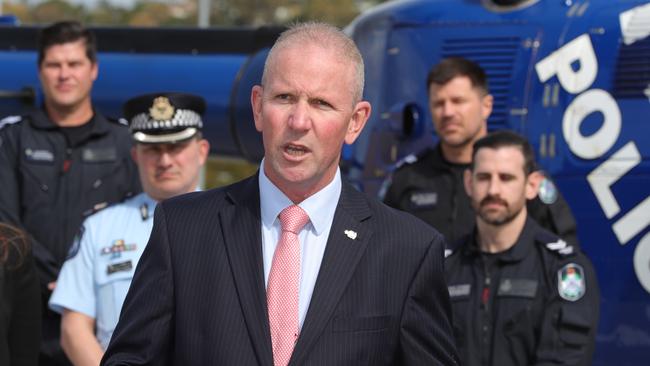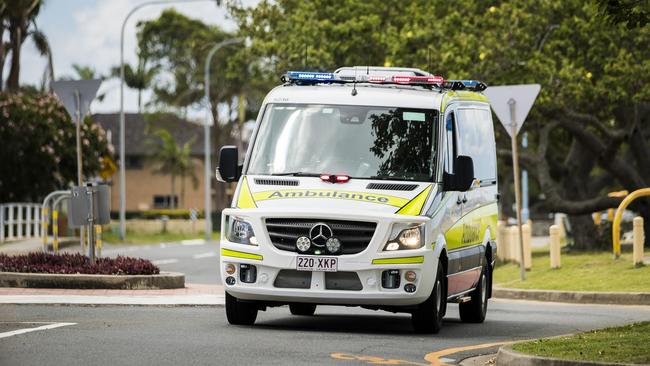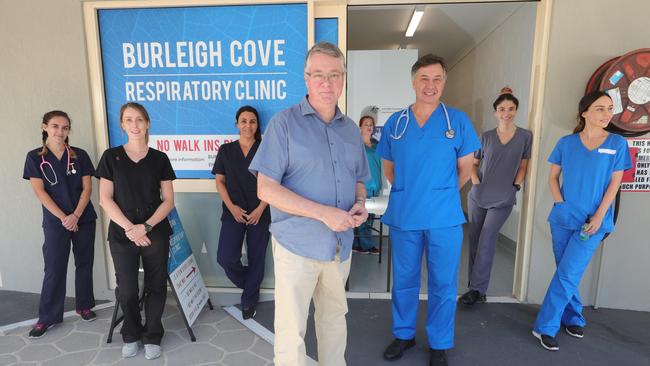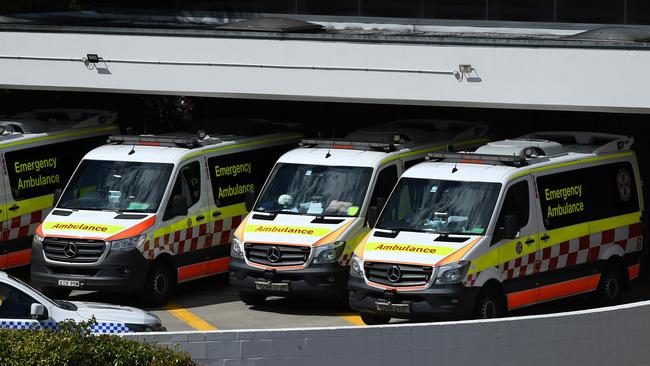Gold Coast police: Queensland Ambulance rep could be posted with police to “streamline” workload issues
Gold Coast police taking on the workload of paramedics almost “daily” amid a shortage of ambulance crews could be blamed in the event of a tragedy, the union fears.
Gold Coast
Don't miss out on the headlines from Gold Coast. Followed categories will be added to My News.
GOLD Coast police taking on the workload of paramedics almost “daily” amid a shortage of ambulance crews could be blamed in the event of a tragedy, the union fears.
To combat the practice, talks are underway to post a Queensland Ambulance Service (QAS) representative in the region’s coordination centre to “streamline” issues during peak times.
Queensland Police Union president Ian Leavers last month hit out at QAS’s “inability to respond to the increasing demand” for their services and said police were often having to cover for the “non-existent ambulance assistance”.
He said there was an “increasing trend” for the ambulance service to “shift their workload” on to police who “are now sitting alongside paramedics waiting to transfer patients at Gold Coast hospitals”.
“I’m receiving reports that it’s now an almost daily occurrence,” he said. “This is dangerous and is inhibiting the ability of police to answer calls for help and arrest criminals.”

NEW TOWER PLANNED NEAR POPULAR COAST BOWLO
He said while police were getting patients to hospital instead of leaving patients roadside for hours it was a dangerous practice for officers.
“We are not trained to provide this care and I fear there could be a tragedy and then a police officer will wear the blame and the trauma of inquiries and inquests,” he said.
The issue was revealed last month, prompting Commissioner Katarina Carroll to address the increase in demand for emergency services with her QAS counterpart.
Top brass from the agencies have since met to discuss ways to better manage emergency calls, which police say have increased exponentially.
A Queensland Police Service spokeswoman said they were developing an “operational communications plan” to ensure the appropriate emergency response is delivered in a timely and safe manner.

SCAMMER'S 'CLONED' IPHONES RUSE SNARES BUYERS ACROSS COAST
Talks are also underway to post a QAS representative in the southeast police region’s coordination centre, similar to what occurs during major events.
“The aim is to streamline issues as they arise, fast-track inter-service communications by providing real-time advice and better manage operational workloads,” the spokeswoman said.
The spokeswoman said police were provided with “tactical first aid kits” and were trained to “deliver adequate first aid intervention to support a casualty’s life until advanced medical aid providers arrive on scene”.
She said given many of the calls for service were “time critical” it was often necessary to share operational workloads to “ensure the safety and wellbeing of that patient and the greater community”.
“Both agencies will continue to explore ways to co-ordinate and integrate communications staff and enable efficiencies in responding to incidents which require, not only an emergency medical response, but also a policing or community safety response,” the spokeswoman said.
May 14: ‘Perfect storm’ as hospital crisis worsens
THE city’s emergency health system continues to crumble in the face of overwhelming patient demand, with a medical expert warning the service is heading into a “perfect storm”.
Gold Coast Primary Health Network chairman Roger Halliwell said a spike in patients with respiratory illnesses was adding pressure on the embattled emergency departments.
“The rules of engagement still prevent us as GPs from seeing patients who might have COVID or respiratory symptoms that are increasingly starting to present in the community as winter approaches,” he said.

“We are not allowed to see anyone with a cough, sore threat, runny nose, gastro symptoms and the only options people have are respiratory clinics, but these are also at capacity.”
The Gold Coast’s four respiratory clinics were booked out on Thursday because under COVID-19 rules, doctors at these practices are the only medical professionals in the city, aside from ED doctors, allowed to see people with respiratory symptoms.
Telehealth is another option, but Mr Halliwell said these appointments were only bulk-billed by Medicare if a patient had physically presented to their GP in the past 12 months, and many hadn’t so it was putting people off.
“If there are no clinical appointments at the respiratory clinics the only option for those needing a physical assessment is the ED, and that’s problematic for all sorts of reasons,” he said.
“GPs don’t have a choice, we can’t bring people in the back door, we also can’t afford staff and doctors who treat the Gold Coast’s sick and elderly to get unwell and be off work.”
Record numbers presented to the Gold Coast University Hospital emergency department (ED) this week, resulting in a code yellow every day last week. This means the health service is unable to meet demand and had no beds.
Sick patients waited hours as ambulances were ramped and patients waited in corridors for up to a day while doctors hurried to discharge people from wards to free up beds. Staff aren’t coping, with one nurse saying health workers are burnt out and being abused by frustrated and scared patients.
Mr Halliwell said locals had to stay home from work if they were sick and not send their kids to school to reduce the spread of germs, otherwise the pressure on the public health system would intensify over the next few weeks.
“If people stayed at home, over time this would reduce significantly the number of presentations at emergency departments, but they are just not doing that.
“We’re definitely heading into a perform storm as winter approaches.”

A Gold Coast Health spokeswoman said when a level 6.3 for bed capacity was reached (code yellow) it was not cause for alarm in the community.
“It is an internal activation which allows our hospitals to allocate resources,” she said.
“When we experience periods of high demand for bed capacity, we leverage availability
between our two hospitals, as well as partner with the city’s private hospitals.”
She said Gold Coast Health’s emergency department was the busiest in Australia and often had 600 presentations at Gold Coast University Hospital and Robina Hospital a day.
GUH also receives critically ill patients from as far south as Grafton in NSW and provides emergency and specialist medical services to people from northern NSW and parts of regional Queensland.
“During periods of peak demand, we ask people to consider using 13 HEALTH or visit their
general practitioner if their health concerns can be treated outside the hospital setting,” she said.


